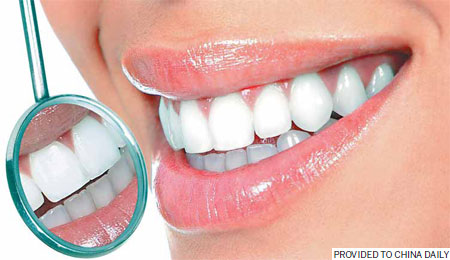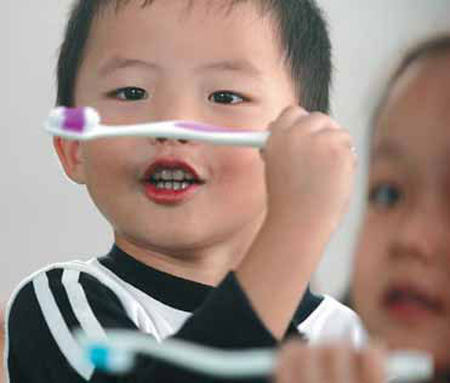Dentist's delight
 |
 |
|
A Health Ministry report indicates 66 percent of children age 5 suffer from tooth decay. Li Bo / Asia News Photo |
 |
More and more Chinese are willing to spend money in exchange for a brilliant set of teeth. Liu Zhihua finds out why healthy, beautiful teeth are now a sign of the times, but a better system of dental health is needed for the man-in-the-street.
A brilliant smile is a show of confidence, but only as long as you have a mouth full of pearly whites. As living standards head north, many Chinese are more aware of physical fitness, appearance and health, paying increasing attention to dental health, and willing to pay for it.
Dong Lei, a senior manager with an international human resources company in Beijing, is a regular visitor to a high-end dental clinic. The Beijinger, in her 30s, says she did not realize the importance of a good set of teeth until she started working 10 years ago in Shanghai.
Her family has a tradition of bad teeth, and to make her smiles more charming and confident, she sought help from an expensive dental clinic recommended by colleagues. She went through a series of treatments, such as scaling and orthodontics.
"It cost me an arm and a leg," Dong says. "But the dentists and nurses were so nice, and my teeth looked so much better. I felt it was worth the money."
There are cheaper options, such as the dental health departments in public hospitals, but Dong says she finds the conditions there unbearable.
"It is too noisy and crowded in public hospitals. The doctors and nurses are always too busy, and you can never expect them to be patient or polite," Dong says. "Besides, to treat a single tooth, you may have to go to the hospital several times. It's just too time-consuming."
After Dong moved back to Beijing about eight years ago, she chose to continue her dental treatments at Arrail Dental, a high-end dental service provider in China. Her whole family uses the dental clinic as well.
Her mother, who used to be afraid of going to a dentist, now reminds Dong to go for dental checks and scaling regularly. "She has become friends with her dentist. He remembers every patient, and my mother no longer feels embarrassed when she has to open her mouth."
Arrail Dental is a clinic chain founded in 1999, and now has 20 outlets in China's first-tier cities. It plans to open another 30 clinics.
Dong's family is not alone in China, and according to the dental clinics, they are part of a growing clientele drawn from top income brackets.
Jiamei Dental Hospital, founded in 1993, claims to be the first chain of private dental clinics in China with 26 clinics in Beijing, Shanghai and Dalian, Liaoning province.
About 80 percent of its customers are Chinese, and its marketing has been focused on the more affluent, according to Zhang Sai, a member of its marketing department.
The most significant shift the private clinics have seen is that target customers are now wealthy Chinese, and not solely expatriate, as in the past.
"Almost all clients in our clinic are Chinese," says Hai Yan, director of the Arrail Clinic in Beijng's Haidian district. "They are mainly high-ranking executives from the nearby office blocks, and teachers from the universities."
Hai's clinic first opened in September 2003. It was upgraded and reopened last October and now enjoys a 1 million yuan ($158,000) turnover each month.
"In the beginning, we'd be lucky to have about 10 customers a week. Now we have dozens every day," Hai says. She joined Arrail Dentail in 2004, after quitting her job with a well-known public hospital.
"When people can afford it, they will invest in a better quality of life, and that is when they will be more prepared to pay for better dental care."
The most popular services are orthodontics, dental implants, scaling and checkups. Prices are much higher than public hospitals, and patients have to pay for most of the costs, which insurance or government subsidies do not.
But the people who use private dental health facilities are those in their 30s and 50s, well-educated, well-paid and willing to pay for the additional costs, Hai says.
Exclusive private dental clinics have been springing up in the last few years because of the large potential market, according to Huang Huan, editor-in-chief of the Chinese-language version of Dental Tribune, an international trade publication for dentists.
"These are very popular with high-income groups, because of better services and environment compared to public hospitals," Huang says. "Their target customers have shifted from foreigners to wealthy Chinese in recent years."
Although Arrail Dental is one of the only dental health chain clinics spread across China, there is an increasing number of competitors opening up in major cities, such as Beijing and Shenzhen, Guangdong province.
But demand still outstrips supply at the moment.
In tandem with the annual Love Your Teeth day on Sept 20, the Ministry of Health released figures that state China has approximately 119,000 registered dentists.
In other words, there is only one dentist for every 11,000 people.
According to the report, 66 percent of children at the age of 5 suffer from tooth decay, and among adults, the ratio increases to 88 percent. In addition, about 86 percent of adults suffer from gum disease, and about 7 percent of the elderly have lost all their teeth.
"China has made great progress in reducing the dental-care shortage, but there is still a long way to go," says Li Gang, an expert on preventive dental care with the No 4 Military Medical University at Xi'an, capital of Shaanxi province. "There are huge differences between the poor and the rich, or among different geographical areas."
Private clinics are a cut above the public hospitals in terms of flexible consultation times and better equipment and services, yet the steep prices will deter the vast majority.
Public hospitals are still the preferred choice for the average man on the street, even though the hospital lines are long, and you may have to wait an entire day just to have a tooth extracted or seen to.
Because of this, and the difficulty in getting reliable, affordable dental care, many people ignore dental health issues until the last possible moment. Or, some may even go to small clinics, either knowing or not knowing that these may be illegal, Li says.
Wang Xiao, director with the dentistry department of Peking University No 3 Hospital, says more than 80 percent of patients go to a dentist only when the pain becomes unbearable. Even then, the decision will weigh more on cost than on quality, since the treatments are at their own expense, more often than not.
"If this happens in Beijing, you can imagine the situation in less privileged areas," Wang says. "More efficient reform of the healthcare system is needed so that ordinary people can have proper dental and medical care."
Contact the writer at liuzhihua@chinadaily.com.cn.






















